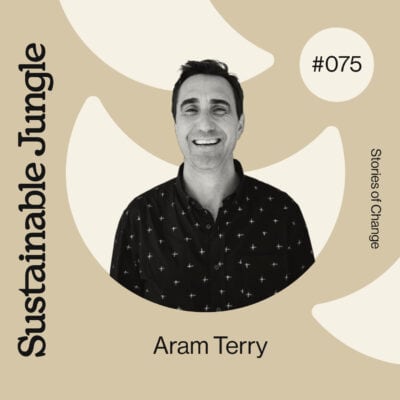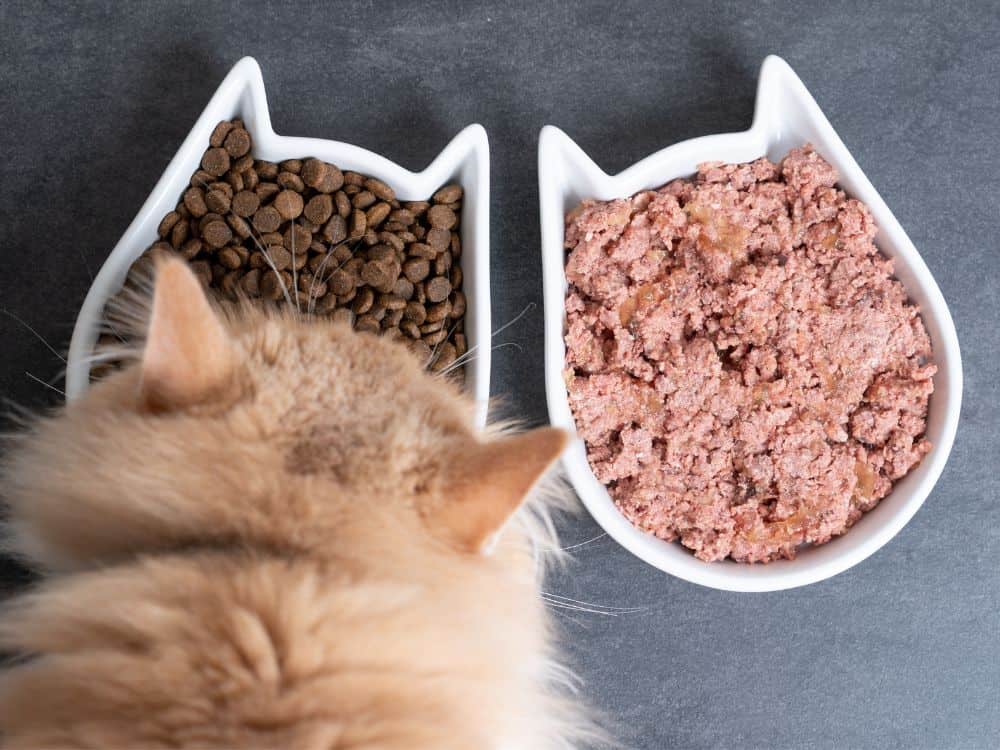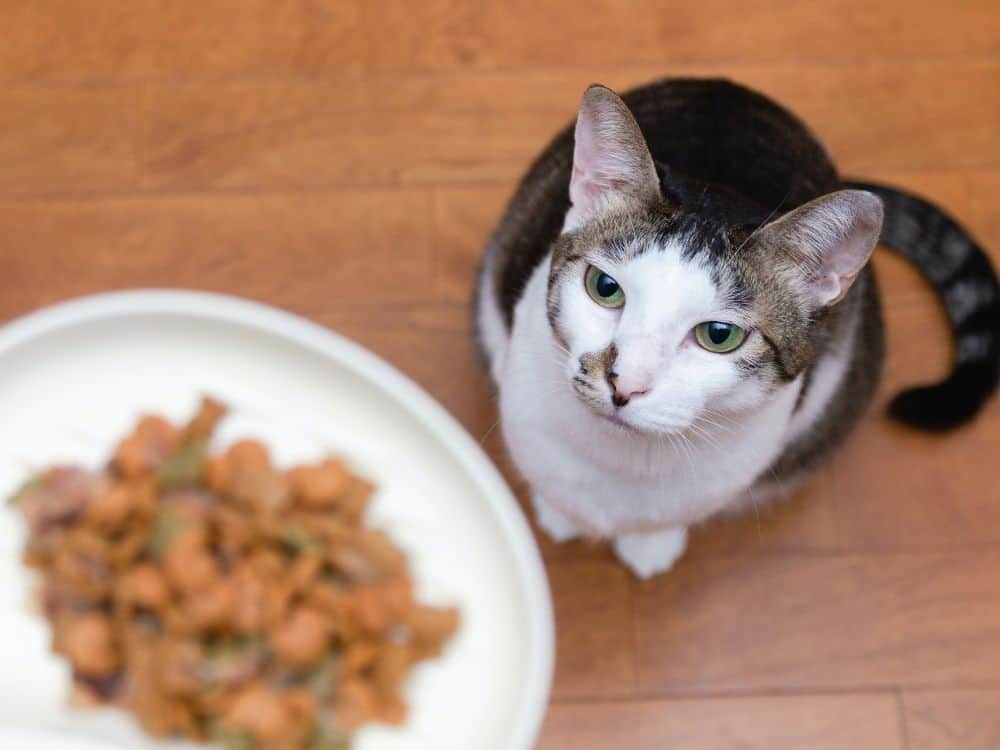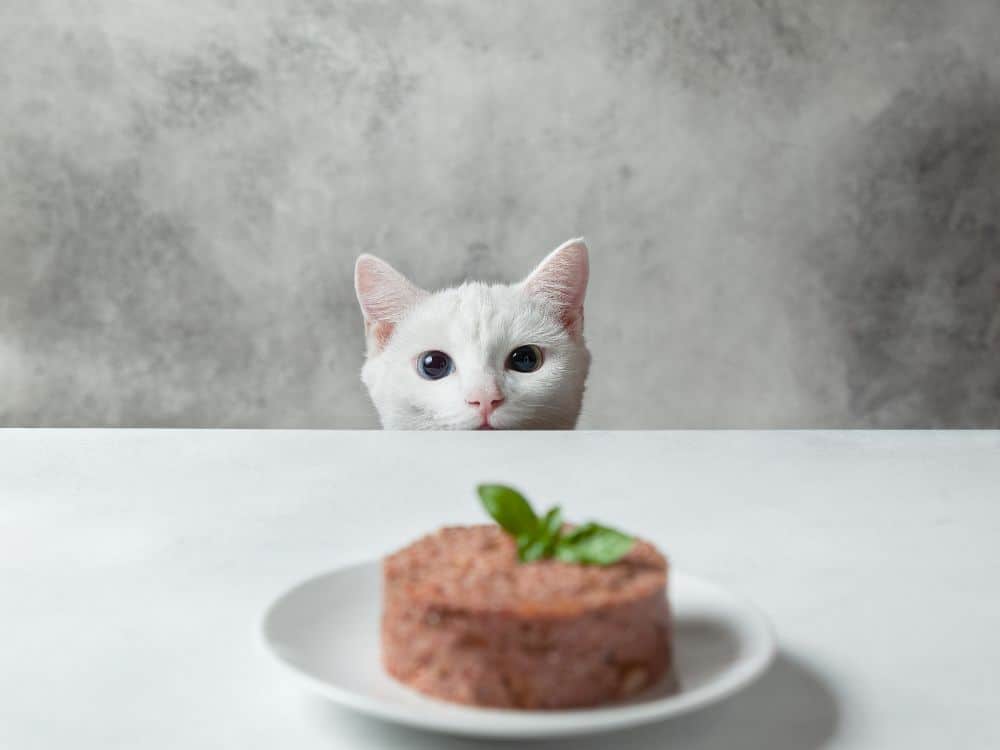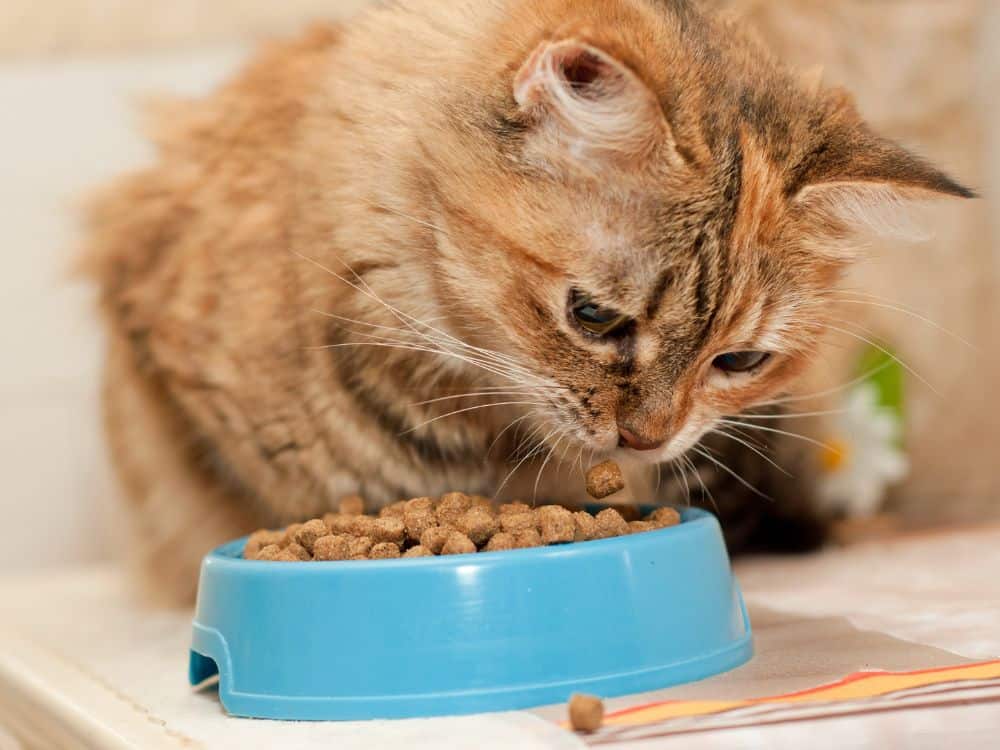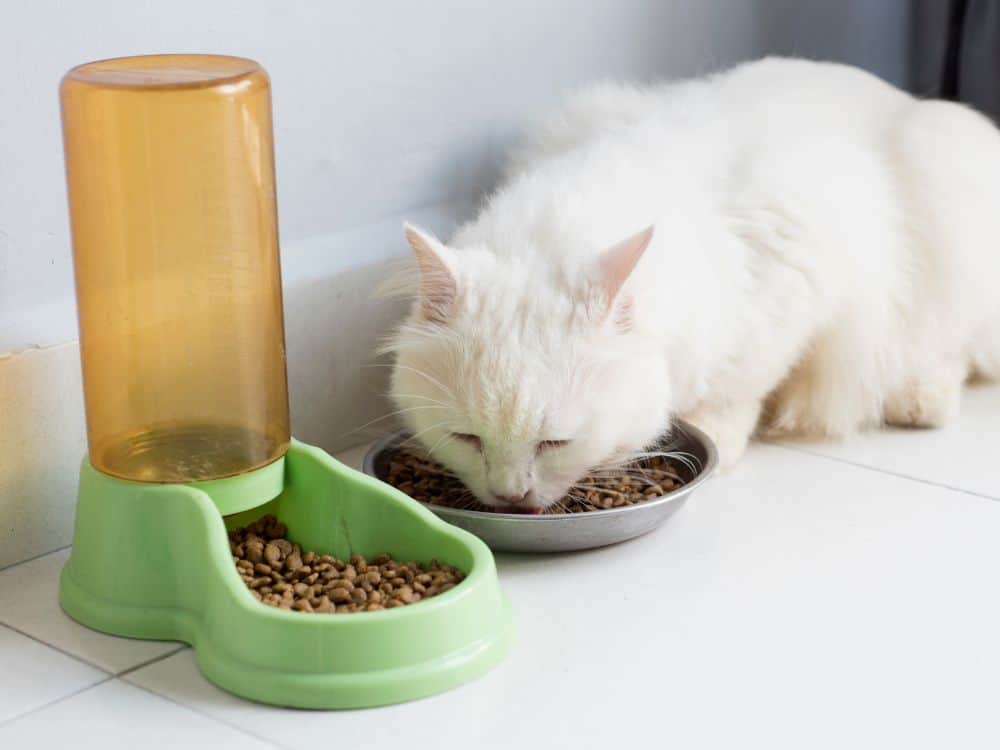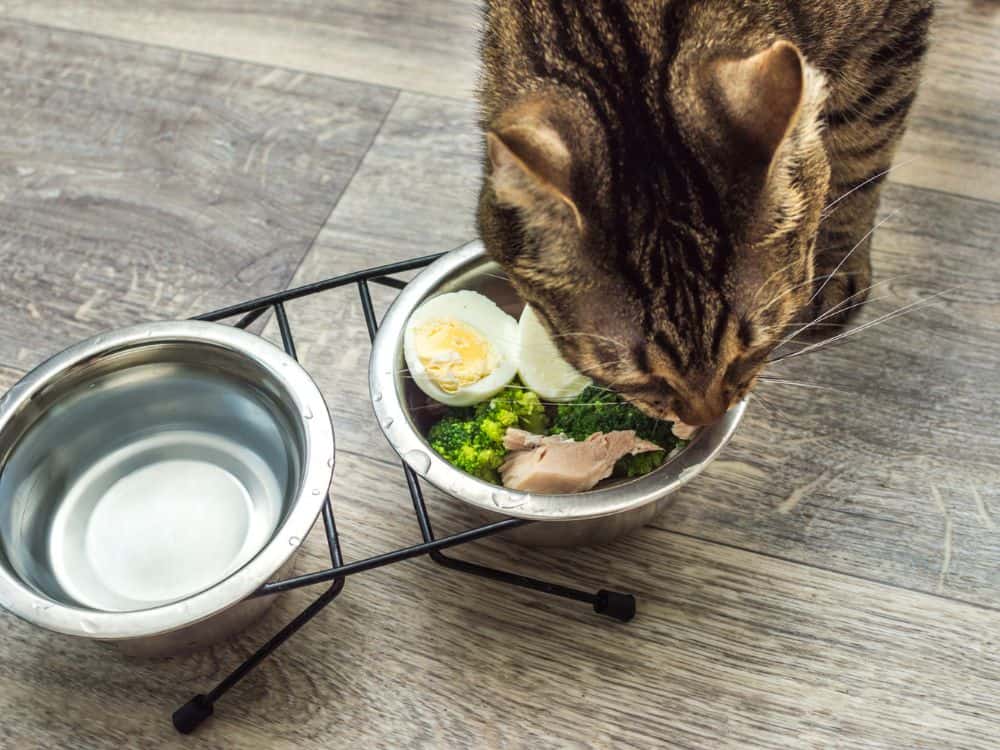Get ready to claw into the meaty (errr… meatless?) debate: can and should our furry feline friends exist on vegan cat food?
As veganism increases in popularity—600% in the US since 2014—so has the notion that our pets should eat plant-based, too. It’s understandable. For pet owners who have made the ethical choice to reduce or end their own consumption of meat, it can feel odd to keep filling your kitty’s bowl with animal protein.
Pets consume a lot—the caloric equivalent of the diet of 63 million Americans—meaning their carbon paw print is likewise a lot (about equivalent to driving 13 million cars for a year).
But it’s one thing to make a private decision about your diet based on sustainability; it’s another thing to make that choice for another living being. Especially when you’re not certain whether it will compromise their health or not. So is vegan cat food healthy for cats? Or will opting for purely plant-based cat food reduce their nine lives by a few?
The vegan pet debate is a clawing one among pet owners and veterinarians alike, so let’s (cat) scratch beyond the surface of whether cats can eat a vegan diet and remain healthy, happy hunters.
Contents: Can Cats Eat A Vegan Diet?
- What Is Vegan Cat Food? Jump to section
- What Diet Is Recommended For Cats? Jump to section
- Can Cats Be Vegan? Jump to section
- Is Vegan Cat Food Safe For Cats? Jump to section
- Can Cats Be Vegetarian? Jump to section
What Is Vegan Cat Food?
First, what’s actually in vegan cat foods? Or regular cat foods for that matter?
Most cat food is created using leftover byproducts of the meat industry not fit for human consumption and would otherwise be thrown away—which is worth bearing in mind if you’re a vegan struggling with the notion of feeding cats meat. Though because these are often low quality, processed, and hormone-filled meats, eco-friendly cat food alternatives are generally safer options that make use of natural, ethically-sourced meats.
Benovo, Ami, Evolution Diet, and Wysong vegan cat food brands each have their own definition of what constitutes a nutritionally “complete” diet based on their own scientific testing. Ingredients common to a vegan cat diet consist of soy, seaweed, oats, corn, peas, potato protein, brown rice, vegan taurine, and seeds which are, in the words of Benevo vegan cat food, “fortified with a range of vitamins and minerals”. Some are actually largely supplement-based, with very little real food at all. Zero waste vitamins are great and all, but humans shouldn’t exist entirely on them—and cats are no different.
But for those who believe vegan cats are possible, the argument is that the hormones, pesticides, and antibiotics present in mainstream cat food are not present in natural vegan cat food.
As such, it’s believed this leads to animals with even better health outcomes due to carefully formulated plant-based pet foods bolstered with synthetic nutrients.
What Diet Is Recommended For Cats?
Though we’re talking about domesticated cats, it’s critical to remember that Felis catus are self-sufficient wild hunters, historically and biologically. And remember what cats eat in the wild; they eat meat.
Cats are unique from dogs, in that they require a much higher protein intake. Dogs have developed into omnivores over thousands of years, which means that they can eat both meat or plant-based sustainable dog food.
For cats, which are “obligate carnivores”, no such vegan cat food evolution has taken place.
An obligate carnivore is considered any animal whose diet is more than 70% meat. This means the species cannot obtain the necessary nutrients they need from grains, fungi, bacteria, or the plant kingdom alone—hence the “obligate”, emphasizing the necessity of the feline’s carnivorous nature. Other animals considered obligate carnivores include tigers, lions, orca whales, dolphins, seals, sea lions, eagles, crocodiles, most snakes, rainbow trout, and salmon.
If you have a cat, you can probably attest to your feline’s natural carnivorous nature—even the most domesticated of cats like to catch prey from time to time.
According to veterinary journalist Dr. Sarah Wooten, “Hunting is an innate behavior in felines. […] In the wild, feral kittens are taught how to kill prey by their mothers. Domestic cats often fail to learn this skill, which is why you will see them ‘playing with anything they catch, or they may bring the mouse to you to kill because they don’t know how.”
The matter of a cat eating meat is not only about the instincts of their brain (and nose) but also the composition of their entire digestive system. The same way you wouldn’t try to feed a rabbit animal meat, you wouldn’t try to feed a cat some carrots or lettuce and expect it to thrive.
Nutritional Requirements For A Healthy Feline Diet
Beyond high protein requirements, cats require 11 essential amino acids which are amply found in meat-based protein sources, but are lacking in incomplete (i.e. plant-based) proteins.
Beyond the basic ones most creatures need, cats also need two very specific amino acids: taurine and arginine.
In nature, taurine is only found in meat and while vegan cat food taurine can be created synthetically, but this doesn’t ensure it really works. Veterinarian Marla McGeorge warns of synthetic powders, “Such formulations may not be as easily absorbed by cats’ bodies as the real thing.”
The second of the two amino acids, arginine, can be found in certain plant sources besides meat, but cats lack the enzymes to properly digest plant fiber and cellulose, which can cause great harm to their system. Compared to omnivores or herbivores, cats have a shorter small intestine, which helps them to eat more frequently and in smaller portions (i.e. catching wild prey). As such, only certain enzymes are secreted that support the metabolic breakdown of only fresh prey—not plants.
In other words, forcing a cat to eat a salad or vegetables means you are forcing their digestive system to digest food that is completely inadequate for them.
Then there is arachidonic acid, a necessary fatty acid for cats normally only occurring in meat.
Finally, cats require high quantities of vitamin A and vitamin B12, which are most prevalent in meat. As such, a healthy cat diet consists primarily of animal protein and fats that come from small prey like amphibians, reptiles, birds, and rodents. While some cats will occasionally munch on grass or plants, most veterinarians or biologists would agree that the small amount of roughage is simply a digestive aid without any significant nutritional value for kitties.
Beyond that, cats pursue their diet based on smell. Meat emits an aroma that appeals to their senses and instincts that synthetic alternatives can never recreate. To deprive a cat of that is perhaps an unjust fight against nature.
Can Cats Be Vegan?
Before you start asking, “Where can I buy vegan cat food?”, let’s talk more about whether you should or not. Herein lies the heart (and guts) of the issue, for which there are two distinct camps: the larger camp of veterinarians who proclaim “no way,” and the small group of vets who do believe in feline veganism.
Arguments Against Vegan Cats
According to Blue Cross UK, “The short answer is no, cats can’t be vegetarian or vegan. Cats are obligate carnivores which means they need meat in their diet. With the rise in plant-based diets in the UK, many have started to consider altering their pet’s diet too. This can be for numerous reasons, such as environment, health or ethical reasons. However, owners must be aware of the risks involved before thinking about feeding their pet a vegetarian or vegan diet.”
Dr. Lindsey Bullen, a North Carolina-based vet and board certified animal nutritionist, says we have to be careful about “anthropomorphizing,” or rather, giving human traits to our furry friends: “Cats are vastly different from the human species. Your goals [for yourself] are great, but we need to keep the pet happy and healthy.”
The British Veterinary Association makes their stance clear in a vegan cat food study, declaring, “Animals should not be forced to share our values.”
Veterinarian Dr, Pete Wedderburn warns that cats will simply hunt for meat anyway, anyhow: “Cats are natural hunters and carnivores–if they are not getting meat at home, they may well go out and get it themselves anyway.”
Arguments For Vegan Cats
Advocates of feline veganism say both cats and dogs have as good or even better health outcomes on a plant-based diet as they do if they eat a carnivorous diet. The only catch is that the food must be created carefully (and professionally) with all the nutrients included synthetically.
University of Winchester veterinary professor Andrew Knight states, “The claim that animals on vegan diets will necessarily become ill and it’s somehow cruel to maintain them, is contrary to the scientific evidence in this field and is ignorant.”
At the University of Guelph in Canada, veterinary researchers conducted some of the first vegan cat food studies to see how cats fared on a vegan diet. Expecting owners to report health concerns like urinary and heart disorders, they actually reported fewer digestive and liver disorders than those whose pets consumed conventional diets.
The vegan cat owners also reported their felines had more ideal body conditions than conventionally fed cats—though it’s worth noting there were no additional groups comparing plant-based foods to natural and organic but still meat-based cat food.
Lead researcher of the study, Dr. Sarah Dodd, states, “We were surprised by these findings. We actually didn’t find any disease or condition that was more prevalent in the cats fed plant-based diets—at least according to owner reporting.”
Pet Owners In Danger For Feline Veganism
In the UK, the vegan pet debate has recently become so intense that some vets warn a vegan diet for cats could land pet owners a hefty fine or even jail time.
British Veterinary Association president Dr Justine Shotton warns, “Under the UK’s animal welfare acts, pet owners have a duty of care towards their pet to ensure that their five welfare needs, including an appropriate diet, are met. Owners could be prosecuted for causing suffering to their pet through inadequate diet, so it is important to talk to a vet first.”
Likewise, the RSPCA UK cautions that pet owners who thrust veganism upon their pet cats risk seriously damaging their cat’s health: “Under the Animal Welfare Act the law requires an owner to ensure all the pet’s needs are met. This includes a healthy diet, as well as suitable living conditions and protection from pain, suffering, injury and disease. Cats are strict carnivores and depend on some very specific nutrients that are found in meat including taurine, vitamin A and arachidonic acid so can become seriously ill if they are fed a vegetarian or vegan diet.”
In essence, cats are extremely challenging to keep healthy with vegan food, since (as aforementioned) they don’t produce certain essential proteins and digestive enzymes on their own as humans do.
Cats have no choice but to absorb the proteins and nutrients from their food, and beef, pork, chicken, and fish have nutritiously high amounts of it.
Is Vegan Cat Food Safe For Cats?
Many cats can survive on vegan food—but surviving is not the same as thriving. Even leading anti-vegan diet professionals admit the research is still inclusive, though the correlations and nutritional logic against a vegan diet don’t have us mewling in favor of it.
While we agree that much of the pet food on the market is pretty garbage, veganism is potentially dangerous for felines—regardless of whether we’re talking organic vegan cat food products, wet vegan wet cat food, or whatever kind you’re considering.
If someone is considering vegan cat foods, they really have to think about the possibility of harm that can be inflicted upon the meat-eating animal. What happens if cats don’t receive sufficient quantities of these nutrients?
Based on expert nutritionists that deem vegan cat food unhealthy, here are some reasons why you shouldn’t feed your cat vegan foods:
1. Malnutrition
If cats don’t have animal protein, they will have to endure tough-to-digest plant proteins. More worrying, the amount of essential proteins in vegan food may be minimal, which could lead to muscle loss, deteriorating immunity, and poor skin health.
2. Taurine Deficiency
Feline taurine deficiency occurs due to malnutrition. However, it needs to be addressed separately because of the severe health problems it poses.
If your feline friend doesn’t get taurine for more than six weeks or cannot digest the vegan food’s synthetic replacement, it can lead to the development of an often fatal heart enlargement condition called dilated cardiomyopathy (DMC), which prevents normal oxygen and blood flow throughout the feline’s little body.
Permanent blindness (from permanently damaged retinal nerves) and various immune system disorders are other consequences.
3. Stomach Sensitivity
Because a vegan diet is unnatural for kitties, their digestive system may suffer. Food allergies could be triggered because of the inability to digest carbohydrates like grains and starchy veggies. This can lead to frequent kitty diarrhea, inconsistent bowel movements, nausea, lack of appetite, and weight control or loss.
Even non-vegan dry kibble can cause these because of the grains.
4. Diabetes
Most vegan pet food products on the market are carbohydrate-loaded. Aside from cats having difficulties digesting carbohydrates, a low-protein, high-carb diet can create insulin resistance in cats and diabetes, especially seniors.
5. pH Disruption
A vegan diet can trigger a change in pH levels, making cats vulnerable to urinary and renal diseases. Cats have an acidic digestive tract, which is necessary to digest raw meat. This means a vegan cat will likely have a highly alkaline body, which could lead to urinary tract infections (UTIs.) Untreated UTIs will often lead to pain, inflammation, bladder infections, and incontinence.
What About Homemade Vegan Cat Food?
Not only is veganism in cats potentially fatal, but even more fatal are homemade vegan cat food recipes. We absolutely do not recommend this.
The best thing to do is first consult your vet about the process of introducing veganism to your cat, and then to purchase commercially manufactured complete vegan or vegetarian pet food that has gone through scientific trials. This is because all commercially produced animal food must fulfill legally obligatory nutritional criteria.
You absolutely must ensure that your kitty’s diet meets all of their protein, carbohydrate, fat, vitamin, mineral, fiber, and essential nutrients needs. Making your own cat food is way too risky when it comes to proper nutritional content specially engineered for cats’ needs.
Can Cats Be Vegetarian?
This would mean allowing for some animal products in the cat food, like eggs and possibly fish (pescatarian). While fully cooked eggs are a great source of protein for cats, eggs are simply not enough to make up for all the minerals and essential nutrients cats require from meat. While you can supplement with vegetarian cat treats, it should not be their whole diet.
Likewise, being a pescatarian cat (only eating fish) is not a complete enough food source for your cat. Fish is deficient in certain minerals and nutrients that cats can only get from animal meat.
Luckily, there are other interesting options emerging for pet owners who wish to bring their carbon footprint down but are reluctant about plant-based diets.
Enter: crickets! It’s not strictly speaking vegan, but it is the closest thing you’ll find to a safe vegetarian diet for cats.
Two billion people eat grub like crickets daily. The Food and Agriculture Organization says that crickets are an especially high source of protein, along with unsaturated fat, dietary fiber, vitamins and minerals.
While we haven’t seen a cat cricket food brand on the market quite yet, Chippin, offers pet food based on crickets. While they are only focused on dogs for now, they believe cricket-based food could be in the cards for a cat’s diet in the future.
No matter what pet food you choose, in the words of Dr. Sarah Dodd, “If you’re going to switch your pet to any unconventional diet, let your family vet know. Pets on these diets may require more monitoring so any potential problems can be caught early and corrected.”
That said, the best approach if you’re absolutely keen is probably to give some of the non-meat supplements and/or foods a try. If your cat refuses to consume them, or doesn’t seem well on them—take your furry friend to a veterinarian for a check-up to see—switch back to the cat’s previous meat-based diet.

